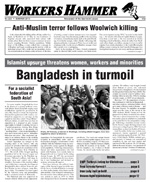
1913 Dublin lockout centenary James Connolly: "For the Citizen Army" This year marks the centenary of the Dublin lockout of 1913, when the working class of Dublin, led by socialist leaders James Connolly and James Larkin, were locked out by the Irish bourgeoisie in an attempt to smash the Irish Transport and General Workers Union (ITGWU). Connolly and Larkin were dedicated to the principles of the class struggle and thus were ardent opponents of the union bureaucracy and the craft-unionist “aristocracy of labour” which dominated the trade unions in Britain. Connolly and Larkin’s fights against these union misleaders came to a head over the 1913 Dublin lockout. We reprint below Connolly’s article on the Irish Citizen Army, a workers militia formed during the lockout for defence of the strikers. It is reprinted from James Connolly: Political Writings 1893-1916, edited by Donal Nevin. A former general secretary of the Irish Congress of Trade Unions who died last year, Nevin wrote a biography of Connolly and edited a collection of essays on Larkin as well as two volumes of Connolly’s writings. The Irish Citizen Army was founded during the great Dublin Lock-Out of 1913-14 for the purpose of protecting the working class, and of preserving its right of public meeting and free association. The streets of Dublin had been covered by the bodies of helpless men, women, boys and girls brutally batoned by the uniformed bullies of the British Government. Three men had been killed, and one young Irish girl murdered by a scab, and nothing was done to bring the assassins to justice. So since justice did not exist for us, since the law instead of protecting the rights of the workers was an open enemy, and since the armed forces of the Crown were unreservedly at the disposal of the enemies of labour, it was resolved to create our own army to secure our rights, to protect our members, and to be a guarantee of our own free progress.... Its influence and presence has kept the peace at all labour meetings since its foundation, and the knowledge of its existence and of the spirit of its members has contributed to prevent the employers and the government from proceeding to extremes against the fighting unions. It has in a true and real sense added many shillings per week to the pay of the union members, since it and it alone has prevented the Government doing in Dublin what it has done in Barry [Cardiff], namely, send soldiers in to do dockers’ work during a strike. Nationally it has done much more. When the great betrayal was perpetrated on Ireland, and [Irish nationalist MP] John Redmond and his followers, aided by all the capitalist press of the country, joined in a conspiracy to rush the young men of Ireland into the ranks of the British Army, the first stirring blow struck against that betrayal was the historic meeting in Stephen’s Green on the night of Redmond’s Mansion House [recruitment meeting] fiasco. Who took the field that night in spite of the massed battalions of the British Army, waiting the word in every barrack square in Dublin? It was the Irish Citizen Army sprang into the gap, and by its fearless presence gave new heart and hope to the dismayed and betrayed people of Ireland. When the first deportation order was issued to the first victim, Captain Robert Monteith, who leaped to arms and invited the people of Dublin to hurl their defiance in the teeth of the Government? Who rallied to the meeting despite torrents of rain, and in face of the open demonstration of armed force by the Dublin garrison? Again it was the Irish Citizen Army! Who on every occasion on which the enemy has struck his blow at those who stood for freedom has ever hastened to the side of the victims declaring their cause to be its own? THE IRISH CITIZEN ARMY!... An armed organisation of the Irish working class is a phenomenon in Ireland. Hitherto the workers of Ireland have fought as parts of the armies led by their masters, never as members of an army officered, trained, and inspired by men of their own class. Now, with arms in their hands, they propose to steer their own course, to carve their own future. Neither Home Rule, nor the lack of Home Rule, will make them lay down their arms.… The Irish Citizen Army will only co-operate in a forward movement. The moment that forward movement ceases it reserves to itself the right to step out of the alignment, and advance by itself if needs be, in an effort to plant the banner of freedom one reach further towards its goal. — Workers’ Republic, 30 October 1915 |
|
||||||||||||||||||||||||||||||||||||||||||||||||
